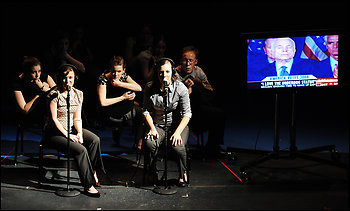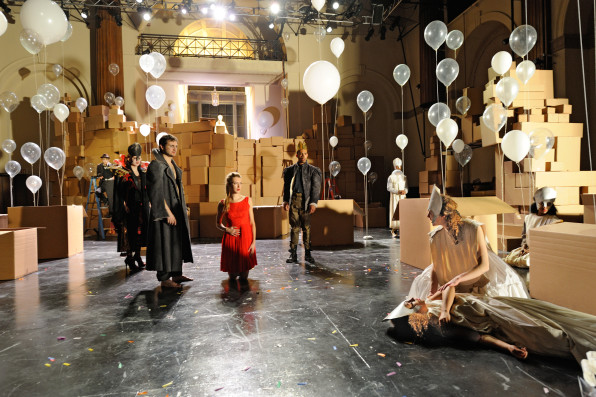available for purchase
at this time.
#StaffChat: Academic Partnerships
#StaffChat posts feature issues, articles, and news that the C1 team discusses as part of our weekly all-staff meeting. We’d love to hear your thoughts too — hit us up on Facebook or Twitter!
♦♦♦♦♦
In the past few months, Company One has been having conversations about different types of residency and partnership models. At this week’s staff meeting, we’ll be taking a deeper look at academic partnerships. Below are a few examples of theatres that partner with universities, and a few articles about how these partnerships first formed, to help guide our conversation.
Many universities choose, as Brown did in 2001, to partner with an already established theatre company to provide new, more professional training and exposure for their students. With Brown/Trinity Rep, this took the form of an entirely new degree program, the M.F.A. in Acting and Directing:
The consortium, which will incorporate the existing Trinity Repertory Conservatory, will provide professional training for the new M.F.A. program at Trinity Rep’s downtown campus…[Trinity Rep’s Artistic Director Oskar Eustis], who had been serving as a visiting associate professor at Brown, has been appointed a full professor. He will direct the new consortium and oversee its M.F.A. program…The consortium faculty will include faculty members of both the Trinity Rep Conservatory and Brown, and the administration and boards of Brown and Trinity Rep will share oversight of the program.
Other university/theatre partners opt for a collaborative relationship which may include residency, but doesn’t fuse the two institutional identities. Theatres maintain their separate non-profit status, while benefiting from shared resources like space, funds, and young artistic talent. In exchange, students get to work closely with career artists and colleges distinguish themselves as training grounds for real professional work. This is the case with the recent partnership between the New School and the Naked Angels:
The two sides anticipate a mutually beneficial arrangement that will help the New School professionalize its legit training programs, while at the same time aid in stabilizing Naked Angels and its producing initiatives in a tough time for fundraising.
With the New School, Naked Angels will incorporate students into its developmental programming — including readings and workshops presented under the banners Tuesdays at Nine, First Mondays and Angels in Progress, as well as the recently launched Naked Radio — and the company will be housed in a New School building in downtown Manhattan. Troupe will nonetheless remain an independent nonprofit with a separate board.
The partnership reps one potential formula for longevity for the smaller Gotham legit orgs that have been battered by the economic slowdown in recent years. To a degree, it matches a template forged by pacts between pro theaters and academic institutions in other cities, including Harvard/A.R.T. in Cambridge, Yale/Yale Rep in New Haven and U. of San Diego/Old Globe in San Diego.
Partnerships can be even less formal and permanent, lasting only for a one-off production, the duration of a semester, or over the development of a project the two organizations co-produce. In exchange, the company is able to provide college credit for student workers, and the university is providing experience for students, while actively participating in a contemporary theatre dialogue. A member of the theatre may direct a production, teach a class, or be temporarily on the faculty. Their presence provides valuable opportunities and access for students. Here’s a snippet from Boston University’s Professional Theatre Initiative, who separate their various alliances into “Core Partners” and “Project-Based Affiliations”:
PTI provides opportunities for stimulating, creative interactions between participating theatres and the BU School of Theatre community. Our hopes for the future are nothing short of creating models or producing relationships that deepen the educational experience, providing a special path for professional experimentation, and creating new possibilities for the creation of new plays for the theatre. Many of our students, faculty, and alumni are linked with a variety of professional theatres of many kinds, sizes, and missions to provide experience and interaction that serve both the participant and the theatre company itself…Often, PTI member theatres provide professional opportunities in acting, directing, and design and/or career development opportunities through internships. In some cases, our interactions with these companies result in new play development and opportunities to conceive new approaches to existent works.

Above from left, Courtney Ulrich, Rachel Caywood, Liz McAuliffe, Lucy Obus and Clark Young have to respond to on-the-spot questions in “The Race.” (Photos By Jonathan Ernst For The Washington Post)
And another look at this type of model, this time looking at Georgetown University’s production of The Race:
“I love watching ‘SNL’ as much as anyone else,” says Rohd, who is spending the semester teaching at Georgetown. His actors are enrolled in his performance-studies course, also titled “The Race.” “And I did write a bunch of satirical sketches,” he adds, “but it became clear early on that it was just not that interesting.”
“There’s no dialogue that’s quite like this, that’s able to get at discussing leadership, in terms of spontaneity, in terms of engagement,” says Clark Young, a senior performance studies and English major from Portland, Maine, who is one of the 10 actors in the show. A goal of “The Race,” he says, is to expand this dialogue to include the audience so that “an ensemble of 10 becomes in the Gonda an ensemble of 210.”
As we think about the various types of partnerships universities and theatres can create when they team up, consider some of these questions:
- — What do we gain from associating with an academic institute?
- — What scares you as we talk about academic partnership?
- — What do we provide to an academic institute? Do we provide value other than professional training?
- — How would partnering with an academic institute help us work towards our mission?
- — Who do we see as potential academic partners in the Boston community?
- — Should we decide to partner with a university or school, does any particular model seem most useful? What would our model of partnership need to accomplish?
